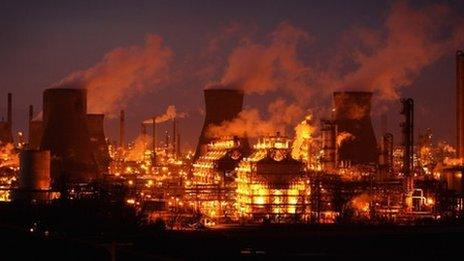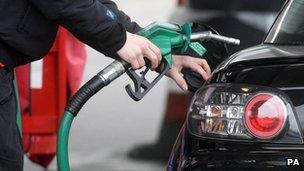How the Grangemouth oil refinery dispute flared up
- Published

The refinery processes around 200,000 barrels of crude oil each day
The Grangemouth dispute's origins and consequences are as complicated as the pipework that snakes and hisses around the refinery itself.
The man at the heart of the affair is Stephen Deans, convener of the Unite union in Scotland, who has worked at Grangemouth for 24 years.
It was Mr Deans' role as chairman of the Labour Party in the Falkirk constituency which landed him in hot water with his employer.
In short, the union official was accused of trying to rig the selection of a candidate for Westminster.
It was claimed that Mr Deans had signed up dozens of new members for Labour, promising the recruits that Unite would pay their membership fees on the understanding that they would back the union's choice in the contest to select a new Labour candidate to stand for parliament in Falkirk, to replace the disgraced Eric Joyce.
Crucially it was alleged that some of the members were signed up in the refinery, ie on the property of Ineos, Mr Deans' employer.
Mr Deans was suspended from the Labour party but then the case against him unravelled.
High stakes
First the police ruled out an inquiry and then the Labour leadership announced that "key evidence" had been withdrawn and it was clearing Mr Deans of any wrongdoing and reinstating him as the local party chairman.
That, you might have thought, would be that. But Ineos is still conducting its own investigation into Mr Deans' alleged activities.
Ineos has previously said the inquiry was due to conclude on 18 October and a decision based on its findings would be published on 25 October.
The union says Mr Deans has been cleared twice already and his treatment by his employer has been unfair.
It wants him cleared immediately and appears to have resounding support among staff; the vote in favour of industrial action was overwhelming with 81.4% of members saying yes to a strike on a turnout of 86%.
The union has now called off the strike - but the dispute remains unresolved, and Ineos said the facility would remain closed until at least Tuesday.
The stakes are high.
The refinery and petrochemicals facility on the Firth of Forth is described by Ineos as a "deeply integrated" site.
The Grangemouth refinery processes around 200,000 barrels of crude oil each day, producing more than nine million litres of clean fuels every day.
It sprawls over 1,700 acres and is not designed to be turned off.

Industry experts do not expect the country to come near to running out of fuel
The UK Petroleum Industry Association says the oil processing capacity of the Grangemouth refinery is 13.4% of the UK's total while Ineos says it provides 70% of the fuel dispensed by Scotland's filling stations.
Brian Madderson, chairman of the Petrol Retailers Association, has said most filling stations would have stock to last between four and eight days.
Even if stocks did run low, supplies could be brought in by tanker from elsewhere in the UK, unlike in previous disputes when lorry drivers were also on strike.
Survival plan
But the financial impact could be significant - and not just for Ineos.
The refinery exists in concert with the neighbouring Kinneil oil and gas processing plant which is run by BP.
The two facilities rely on each other. Kinneil supplies the refinery with most of its "oil feedstock" while steam from the refinery ensures the Forties Pipeline System keeps running - bringing ashore oil and gas from more than 50 North Sea fields.
As for the refinery itself, Ineos management, who previously faced industrial action over pensions, have warned for some time that it is in financial trouble.
The company says it wants to invest £300m in new terminal facilities as part of a "survival plan" to bring in shale gas from the US.
But bosses have said they are not prepared to do so until they are confident that costs at the site, which is losing £10m a month, can be brought under control.
Unless something is done, they claim, the Grangemouth refinery could be closed before 2017.
Unite accuses the management of conflating the issues of costs and the position of Mr Deans and says each should be sorted out independently of the other.
Whatever the truth, thousands of jobs and millions of pounds are potentially at stake below the bright orange flares of the Grangemouth refinery.
- Published15 October 2013
- Published14 October 2013
- Published12 October 2013
- Published11 October 2013
- Published7 October 2013
- Published4 October 2013
- Published1 October 2013
- Published30 September 2013